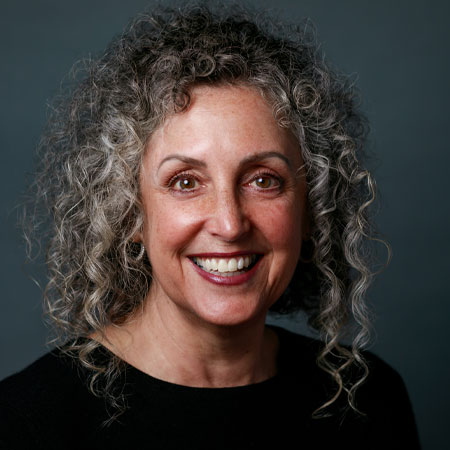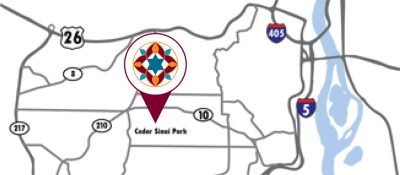by Kimberly Fuson, Chief Executive Officer
March 1, 2023
Three years ago, our trustees offered me the privilege to return to Cedar Sinai Park to help steer the organization on to a path of sustainability. With all my heart, I want Cedar Sinai Park to find and take steps to a solid future that will adapt maturely to the changing times and carry us into our next century.
At the core of our mission, always, is caring for our beloved elders, with no compromise. That was the intent of our forebears when they met for the first time on January 4, 1920, to plan for the Jewish Old People’s Home—the first iteration of assisted living—and the Jewish community can be proud of the gemstone that was created and is dearly cherished.
Across the nation, single-site, faith-based, not-for-profit elder care communities are being challenged. Many are failing; hundreds closed last year in the United States. Others are merging or affiliating with bigger corporations.
Decades before the Covid pandemic, the 103-year-old Robison Jewish Home (dba Cedar Sinai Park) has contended with decreasing Medicaid reimbursements. Medicaid does not cover overhead, and only reimburses a certain percentage of each resident’s stay, per day. The reimbursement rate has ranged from 60 to 80 percent over the past decades. Given that the majority of our residents at Robison Jewish Health Center and Harold Schnitzer Center for Living utilize Medicaid, there is a significant gap in what we are paid, and what we have to spend to meet our high standards of care.
Our supportive community has subsidized resident care and services to offset some of the losses. Cedar Sinai Park received significant PPP (Paycheck Protection Program) funds during Covid, which directly subsidized staff wages.
We’ve also known since 2007 that the number of individuals approaching retirement age was rapidly increasing while the available population of caregivers was steadily decreasing. There are not enough nurses in the pipeline because Oregon has the third fewest graduates in nursing programs, and we rank last in the country for degrees awarded from public institutions. Nationwide, we are in a care crisis of monumental proportions.
Despite the ever-changing regulations of short- and long-term nursing care, historically, Robison stayed ahead of the labor curve, thanks to its excellent wages and benefits and terrific culture of community.
However, roughly 15 percent of the national nursing home workforce left the sector when the pandemic began. Finding qualified staff for Robison Jewish Health Center who want to work has been a major hurdle, despite a wage study we conducted during the summer of 2022, which resulted in substantial wage increases for our health professionals. With lower than desired numbers of staff, we haven’t been able to utilize all of the 44 beds in Robison Jewish Health Center short-term skilled nursing since the pandemic hit.
To maintain the quality care for which Robison is known, we have been relying for the past few years on “agency” health professionals, that is people contracted temporarily as nurses, licensed nurse practitioners, and certified nursing assistants. Agencies demand salaries for their professionals two to three times higher than what our employees receive, depending upon the shift they are asked to work.
Our significant staffing shortage coupled with the crushing cost of agency labor means Cedar Sinai Park is facing critical shortfalls monthly. If we continue on our current path, we determined our expenses would soon exceed our cash reserves and given the current climate, we believe we must act now.
With strong support from our trustees, on March 6, we reduced admissions to our post-acute and rehabilitation services at Robison Jewish Health Center.
The 48 private suites in the four households of the Harold Schnitzer Center for Living remain open, and skilled nursing referrals continue to be accepted on a more limited basis. We are consolidating all of the Robison Jewish Health Center clinical staff into the Harold Schnitzer Center for Living, and have eliminated all agency health professionals.
All of our Robison Jewish Health Center nursing department positions are preserved. All staff wages have been preserved.
We are consolidating culinary services, and all food production will occur at the Rose Schnitzer Manor kitchen, which will return us to an all-kosher campus.
Seven important humans, who will always be part of our Cedar Sinai Park family, are affected (reduction of hours/lay-off) by the change to Robison post-acute care services. We love all our staff and have made every effort to ensure they are cared for and supported during this transition. All staff affected by the suspension of admissions will be offered coaching/counseling, job referrals and letters of recommendation.
Robison Jewish Health Center/Harold Schnitzer Center for Living, Rose Schnitzer Active Assisted Living, Adult Day Services, and Sinai In-Home Care are fully functioning and open to the community. We continue to find ways to enhance our care and services, and to improve the quality of life for our residents.
Above all else, Cedar Sinai Park must remain viable for the elders and vulnerable who rely upon us. We have a long tradition of high-quality care and staffing, and we want to maintain that reputation in the community. The decision to reduce Robison admissions was not made lightly; we believe it is the best way to achieve our long-term goals.
Cedar Sinai Park is working with two expert advisory firms to help develop scenarios for sustainability. HJ Sims is an investment banking and strategic consulting firm specializing in senior housing financing. Clifton Larson Allen is an accounting firm whose focus is market analytics for senior care and other industries. We are also consulting with our industry peers and trade associations.
Once those analyses are conducted, Cedar Sinai Park will be in a better position to make decisions about its path to sustainability. We are a strong and sound organization. Cedar Sinai Park must change in order to be responsible and serve the needs of the Jewish community.
Thank you for your generous support of the Home for all of these years. We appreciate your gifts, your guidance, and your grace as we go through this important transition.



